Top Stories
Dawson Creek Faces Drought Emergency, Proposes Water Pipeline Solution

Dawson Creek, a city in British Columbia, is grappling with a significant drought emergency that has prompted local officials to propose a controversial solution: constructing a water pipeline to supply water to the very industry some blame for the water scarcity. As the region experiences extreme dry conditions, the city council is weighing the implications of this plan, which could have far-reaching consequences for both residents and local businesses.
The city has reported that water levels in reservoirs have dropped to critical lows, with a 40% decline compared to previous years. This alarming situation has spurred the local government to take immediate action, with a proposal to transport water from nearby sources to mitigate the drought’s impact. The projected cost of the pipeline is estimated at $2 million, a significant investment aimed at safeguarding the community’s water supply.
Local industries, particularly the agriculture sector, have been identified as contributing factors to the water crisis. Critics argue that the high water consumption by these industries exacerbates the drought conditions. As a result, some community members are concerned about the ethics of supplying water to the very entities that may have contributed to the problem.
In response to these concerns, city officials have emphasized the need for an immediate solution to protect the city’s water resources. “We must act now to secure our water supply for the future,” stated Mayor Diane Thorne during a recent council meeting. The proposed pipeline aims to provide a sustainable solution for both residents and local businesses while addressing the urgent need for water.
While the city council has yet to finalize plans, discussions are ongoing regarding potential partnerships with local industries. The council is considering whether to charge these businesses for water access, ensuring that costs are covered while also promoting responsible water use. This proposal is set to be revisited in the upcoming council meeting scheduled for July 15, 2023.
As Dawson Creek navigates this challenging situation, the community’s response remains mixed. Many residents are supportive of the pipeline initiative, recognizing the immediate need for water access. Others, however, caution against prioritizing industrial usage over residential needs, highlighting the importance of sustainable water management practices.
The situation in Dawson Creek reflects broader challenges faced by many regions experiencing similar drought conditions. As climate change continues to impact weather patterns, local governments worldwide are grappling with how to manage water resources effectively. The decisions made in Dawson Creek may serve as a case study for other communities facing similar dilemmas.
In conclusion, Dawson Creek’s proposed water pipeline represents both a potential solution to the current water crisis and a source of contention within the community. The coming months will be crucial as city officials work to balance the needs of residents and industries while ensuring a sustainable approach to water management. The outcome of this situation could have lasting implications for the city and its residents.
-

 Science3 months ago
Science3 months agoToyoake City Proposes Daily Two-Hour Smartphone Use Limit
-

 Top Stories3 months ago
Top Stories3 months agoPedestrian Fatally Injured in Esquimalt Collision on August 14
-

 Health3 months ago
Health3 months agoB.C. Review Reveals Urgent Need for Rare-Disease Drug Reforms
-

 Technology3 months ago
Technology3 months agoDark Adventure Game “Bye Sweet Carole” Set for October Release
-

 World3 months ago
World3 months agoJimmy Lai’s Defense Challenges Charges Under National Security Law
-

 Lifestyle3 months ago
Lifestyle3 months agoVictoria’s Pop-Up Shop Shines Light on B.C.’s Wolf Cull
-

 Technology3 months ago
Technology3 months agoKonami Revives Iconic Metal Gear Solid Delta Ahead of Release
-

 Technology3 months ago
Technology3 months agoApple Expands Self-Service Repair Program to Canada
-

 Technology3 months ago
Technology3 months agoSnapmaker U1 Color 3D Printer Redefines Speed and Sustainability
-

 Technology3 months ago
Technology3 months agoAION Folding Knife: Redefining EDC Design with Premium Materials
-

 Business3 months ago
Business3 months agoGordon Murray Automotive Unveils S1 LM and Le Mans GTR at Monterey
-

 Technology3 months ago
Technology3 months agoSolve Today’s Wordle Challenge: Hints and Answer for August 19









